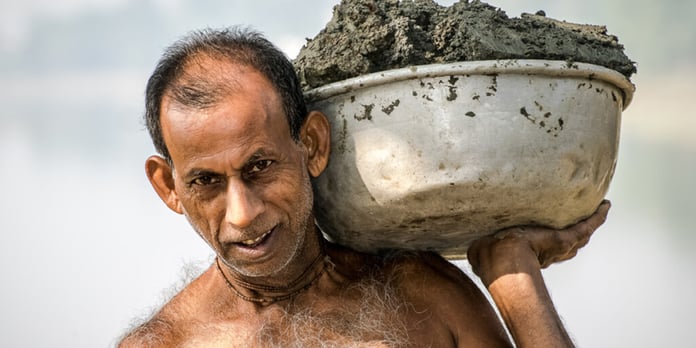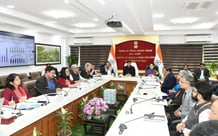
With the world down on its knees burdened with the pandemic which out-weighs all other “issues”, situations are especially dire for under-developed nations like India which face a larger risk of transmission of this COVID-19 virus due to their high population and not so developed medical infrastructure. There are many hurdles that the government is facing every day to provide relief to the people, in spite of which, the common people are greatly affected by the pandemic and the lock-down measures taken to restrain its growth.
The most talked-about and relevant issue that is making headlines these days is of the migrant workers being abandoned in the arms of an unknown city. There are thousands and maybe lakhs of people who are stuck in different parts of the nation amidst this lock-down, unable to reach their homes and are forced to stay away from their families. Most of these are the daily-wage earners and laborers who on finding themselves empty-pocketed and after being denied the permission and means to travel home, started their journey on foot to reach their destination. The news-clips of these migrant workers are severely upsetting and have all of us wondering what measures would relieve their anguish. Although we do agree that their struggle is real, here is our series of hypotheses on the unexplored regions of the situation.
WHY MIGRATING BACK TO YOUR NATIVE PLACE IS NOT THE BEST IDEA?
The situation in India is worsening every minute as we are falling deeper in the pit of despair and it is difficult to crawl back up. Our lack of sufficient financing and medical expertise is adding to our hardships. Workers who have migrated from rural areas in search of labor to several urban areas are finding it hard to make both ends meet and hence, are trying to reach their native place. But it is important for all of us to understand that this might not be the best course of action right now. Some of the reasons being
- Arranging transportation is not a problem, the main issue at hand is to conduct rapid, ‘precise’ and a large number of tests on all the people who are to travel.
- Announcement of such a scheme would only create a ruckus and chaos among the people and it will become impossible to contain them with simultaneously following the norms of social distancing. The mayhem would be because everyone would want to go first and fast. A good example of this was seen on 28th March in Delhi, where within a week after the announcement of the first Lock-down, a large crowd of thousands of migrants gathered at Anand Vihar Inter-state bus terminus, in an attempt to go back to their families.
- If the government arranges for them to travel back, and even one of the passengers is found to test positive for the antibodies, there are chances of the infection spreading to all the co-passengers. And since most of the migrant workers come from smaller towns or villages, all the villages and rural areas will fall under the risk of Covid-19
- It is becoming difficult to contain the spread of coronavirus even in big cities with all the facilities, then imagine the wreck it would cause if it were to hit the villages where neither are the people equipped with enough facilities to sanitize themselves nor are the norms of social distancing very strict.
Yes, these are the very people who form the base of our social ladder and act as vote-banks for the political parties who want to establish their democracy. So, are we supposed to drop the issue and let them be? Are we to ignore the headlines carrying the misfortune of a father so poor that he could not reach home to see his own child’s body? Are we supposed to let the numbers of those slides who are running away from death and to its very arms? What SHOULD be done? Because clearly, the blame-game has gone on long enough.
ALTERNATIVE SOLUTION:
Instead of fixating on the problem of providing transportation and risking the lives of not just the workers but also their families and the entire community, they will be traveling to, here are the alternatives that we can adopt to provide immediate relief.
- The focus should be to provide basic necessities like food and rent-free shelter for the people to stay in because hunger is the motivation that is pushing them to race the roads and complete the concrete.
- The people living in slums and crowded communities should be put through regular sanitization and check-ups as a part of the government’s plan to prevent community-spread as happened in Dharavi- the biggest slum of Mumbai, increasing the number of infected people by several hundred.
- The government has invested a lot of money in improvising and aiding various sectors, but relief measures for the migrant workers and the laborers managed to escape significant mention in any. Separate funding should be allocated to them and economic security must be ensured to them.
- Stringent laws against anyone that mistreats the migrants and those lacking resources should be passed so as to provide them social security. This will encourage them to stay put wherever they are.
- NGOs and the General public should come forth and offer help and support in any form possible
FLARING FARES:
On being severely reprimanded the Government started the railway services called the “Shramik Trains” to help those migrants stranded in different parts of the nation to reach their homes.
However, the fares being collected from them are in fact higher than usual and include food and shelter charges. There are two possible reasons for the same
- To revive the plummeting economy
- To discourage a large number of people from opting to travel.
Apart from this, a selected number of trains are being run for the other sections of the population too. The only logical explanation is that, with its reserves on the verge of completion, the government is forced to re-run its engines. And unusually high taxi and bus fares are being collected even from those returning from foreign nations.
The condition of those thousands of migrants is truly pitiable, but the only thing driving them to the cause is the lack of food and a roof to live under. Let us unite to help them fight in this hour of need by continuously urging the government to take stringent measures for their benefit and providing monetary and moral support from our side. The power of thought and unity is unparalleled, therefore, to think and stand by our fellow citizens is our responsibility.
*co-authored by RAJVI BAJPAI, a medical student.













